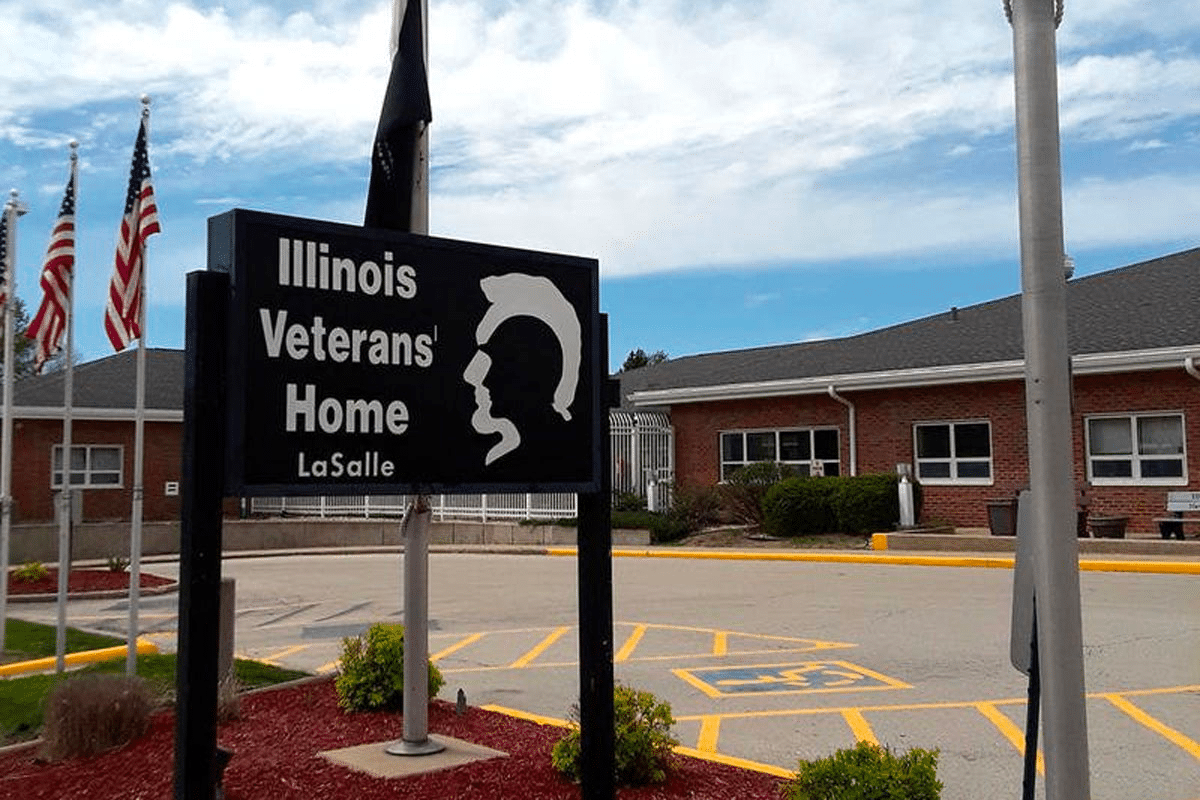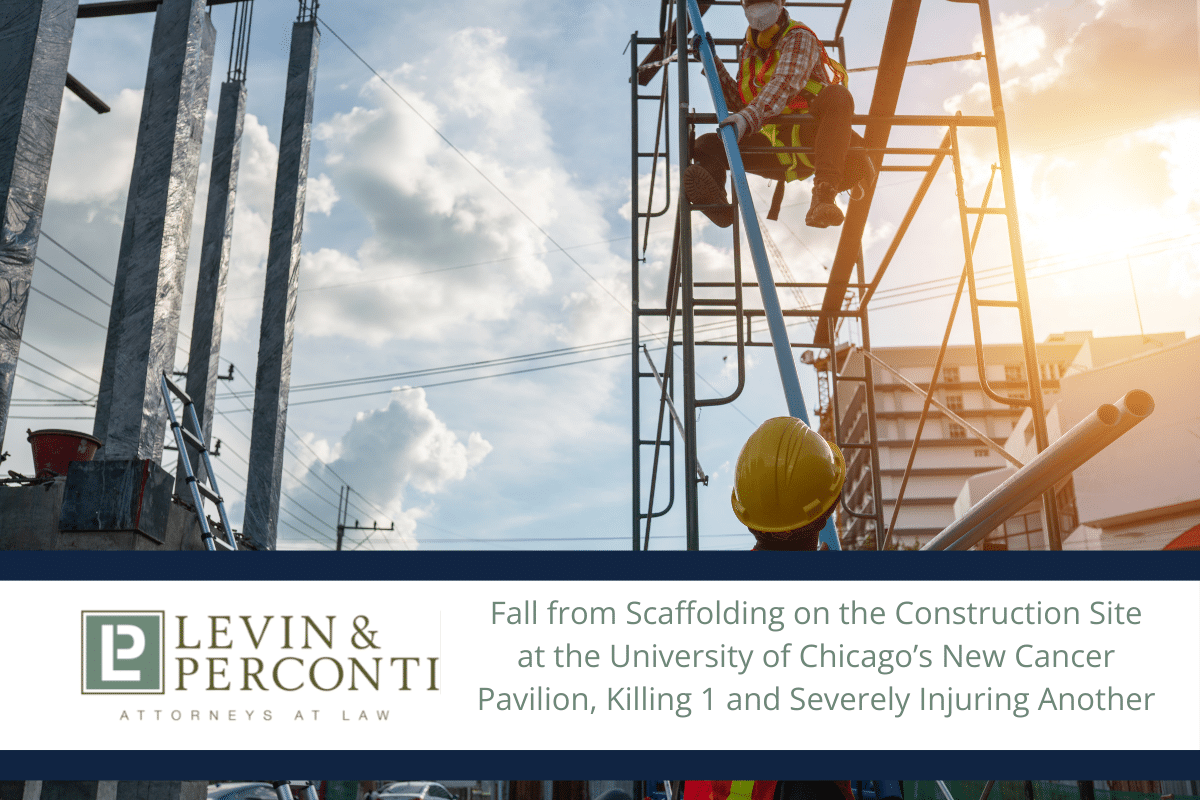Levin & Perconti filed lawsuits for the families of 27 veterans who contracted COVID-19 due to a preventable outbreak at LaSalle Veterans’ Home in late 2020.
Twenty-six of those veterans died.
Though COVID-19 safety protocols were well known by the time of the outbreak, LaSalle Veterans’ Home in Illinois did not have a comprehensive COVID-19 plan. In a scathing report, state investigators called staff’s handling of the outbreak “inefficient, reactive and chaotic.” Veterans who tested positive were not isolated. Nursing staff continued to report to work despite COVID-19 exposure. The facility did not even have effective hand sanitizer.
“What happened at LaSalle Veterans’ Home is unimaginable,” Levin & Perconti founder and senior partner Steven Levin said. “It’s not like they did something and did it wrong. It’s not like they took action that turned out to be wrong in light of greater knowledge. They did nothing. That is shocking. They did nothing.”
The outbreak began Nov. 1, 2020, when two residents and two employees tested positive for COVID-19. By the end of the month, more than 200 people had tested positive. In all, 36 veterans needlessly died.
Levin & Perconti has filed lawsuits against the state of Illinois, the Illinois Department of Veterans’ Affairs, LaSalle Veterans’ Home and several senior administrative, medical and nursing staff members at the long-term care facility.
“These veterans’ families feel a sense of anger, outrage and deep betrayal,” Levin & Perconti managing partner Michael Bonamarte said. “These men and women chose to spend their final years at LaSalle Veterans’ Home because they trusted they would be safe. That trust was betrayed. There was no effective leadership at LaSalle, no top-down communication. Staff wasn’t following even the most basic COVID-19 protocols, such as wearing masks, washing their hands and isolating people.”
No Response Plan
According to the lawsuits, various LaSalle employees — including nurses, nursing assistants and nurses’ aides — attended an off-site party on Oct. 31, 2020. As residents and staff tested positive for COVID-19 in the following days, nursing staff continued to report to work and care for residents.
A report from the Illinois Department of Human Services’ Office of the Inspector General said a lack of preparation “contributed to the scope of the outbreak.” LaSalle leadership failed to effectively communicate, train and educate employees. Many staffers acted like they were unaware of basic infection control protocols.
“The risks concerning transmission and control of COVID-19 were well known by October,” the report said, “yet, [LaSalle Veterans’ Home] lacked any formal preparedness and response plan.”
“Nursing homes are different than any other health care facility because the residents are living communally, they are highly susceptible to illness and are not in a position to protect themselves from the ravage of this virus,” Levin said. “They are 100% dependent on staff.”
A Nov. 13, 2020, site visit from the Illinois Department of Public Health found the facility had improper hand sanitizer, improper use of personal protective equipment (PPE), improper screening protocols, improper observance of proper social distancing protocols and improper hand hygiene and glove use.
“Long before the COVID-19 pandemic,” Levin said, “anybody working in long-term care facilities knew the dangers of airborne viruses. There have been long-standing federal and state regulations requiring facilities to have uniform policies and procedures in place related to infection control. In the aftermath of the Legionnaires’ outbreak at the Quincy Veterans’ Home, a third-party audit in 2019 made recommendations for improvement of the infection control policies at the LaSalle Veterans’ Home. These recommendations were ignored and disregarded.”
‘He Died Before He Should Have’
Plaintiff David Liesse lost his father to the COVID-19 outbreak.
“How can you have an administration that allows people to run a veterans home with such lax security and scrutiny over what’s happening?” Liesse asked. “The whole thing could’ve been prevented. Someone needs to be responsible for what was done, what wasn’t done, and what was supposed to be done.”
During World War II, U.S. Air Force veteran Jerome Liesse delivered supplies to troops around the world. He earned three medals for his service and later worked in finance; he spent 30 years volunteering with the Special Olympics.
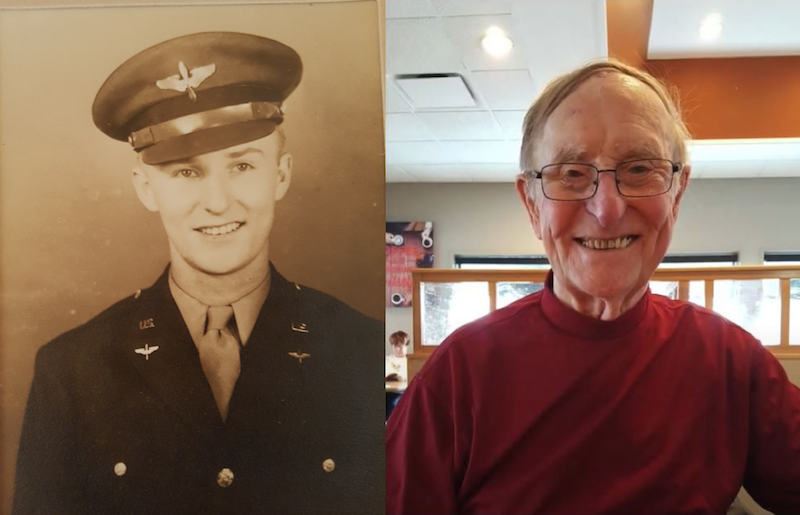
Jerome Liesse tested positive for COVID-19 on a Friday in November 2020, his son said, and died the following Tuesday.
“Because of COVID and mistreatment at the veterans home, he died before he should have,” David Liesse said, adding that “someone had to bring COVID into his room. It didn’t jump through the window.”
By late 2020, many of the veterans’ families thought there was light at the end of the tunnel. They had kept safe distances, communicating through windows. Vaccines were about to become widely available.
“When families learned about the extent of the negligence at LaSalle,” Bonamarte said, “it was particularly shocking and devastating. They were following the rules outside, but what was happening inside? These deaths didn’t happen in the natural course of events; they were painful and preventable. That’s hard to swallow.”
‘I Put My Trust In the VA’
Plaintiff Mary Beth Schomas said no one from the VA notified her that her father died after contracting COVID-19 during the LaSalle outbreak. She learned about his death from the hospital where he passed.
“I only heard from the hospital, which really bothered me,” she said. “When I went to LaSalle to pick up his stuff, they just acted like it was no big deal. Here it is. Go.”
Her father, U.S. Army veteran Bernard Schomas, served as a medic in World War II under General George S. Patton. Schomas was at the Battle of the Bulge and earned numerous medals. At 95, he was healthy, mentally sharp and liked to use his phone, his daughter said. “He was one of the healthiest old guys in there.”
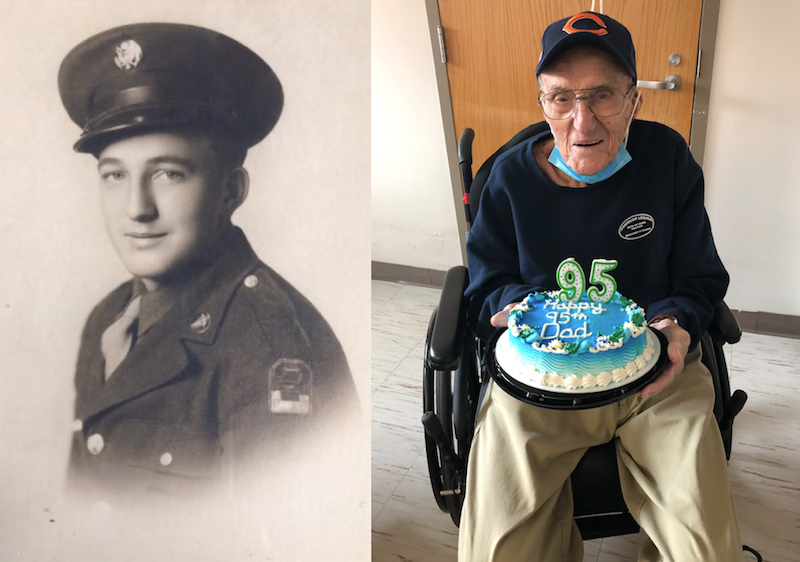
Bernard Schomas tested positive for COVID-19 on Nov. 7, 2020, and was diagnosed in the weeks to follow with pneumonia, a urinary tract infection, dehydration and sepsis. He died on Dec. 17, 2020, without any family by his side.
“There was no reason for him to die had they taken care of him,” Mary Beth Schomas said. “I tried to get him help, and no one would listen. It’s hard. I’m angry. … I don’t want this to happen again to anybody. It shouldn’t have happened to him, and it did. I always said he was going to live to be 100 — and he would have. I put my trust in the VA, and I think I had false trust. … I feel bad that I continually told him that it was going to be OK and he was in the best place ever.”
Making matters more frustrating for many of the families is that, starting in 2015, a series of similarly mishandled outbreaks of Legionnaires’ disease occurred at Quincy Veterans’ Home in downstate Illinois. At least 14 deaths were linked to the preventable, water-borne illness. The state was sued by multiple families and paid out millions in settlements.
Gov. JB Pritzker referred to the outbreaks as “fatal mismanagement.”
“Neither the state nor the Illinois Department of Veterans’ Affairs learned from their previous mistakes, which cost the lives of 14 veterans in Quincy,” Bonamarte said. “The state admitted responsibility but didn’t accept accountability.”
‘He Was Struggling to Breathe’
U.S. Army veteran Richard Cieski built roads in Korea as an operating engineer during the Korean War. He earned three service medals and entered LaSalle Veterans’ Home in 2017 due to dementia and Alzheimer’s disease.
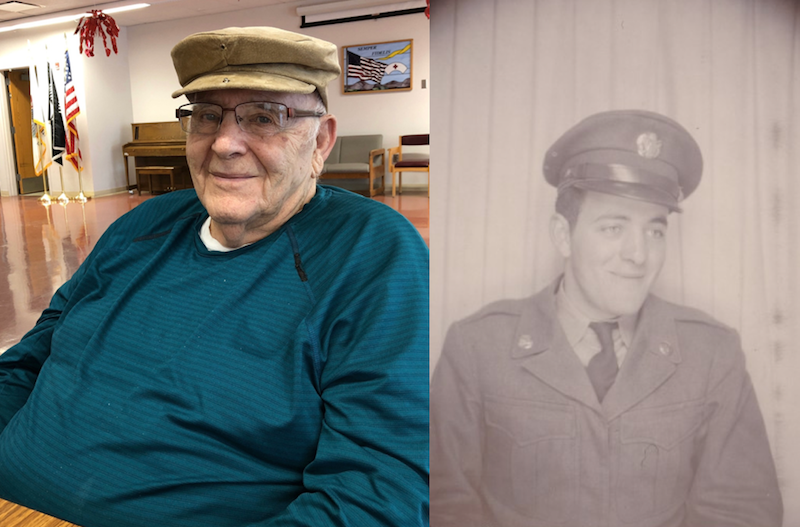
He suffered without morphine for some of the final hours of his life, his family said.
“He was struggling to breathe,” granddaughter Lindsay Lamb recalled. “He needed his morphine. He had asthma. Now he had COVID. He needed some sort of comfort.”
According to Lamb, a physician’s assistant told the family an order for morphine was in Cieski’s file. But when he desperately needed the drug in the hours before he died, a nurse said no such order existed. What more, Lamb said, the VA was out of morphine and awaiting a shipment from Iowa.
“He suffered to breathe because they did not have the proper medication during a pandemic after it was prescribed to him days before,” Lamb said. Cieski died on Nov. 15, 2020, a few hours after the morphine was finally administered. “He was alone. He had the nurses with him, but none of the family.”
“None of this had to happen,” Lamb continued, “and that is what was so frustrating. We gave them our trust to take care of him. … These men served our country and protected us and probably experienced things that we could never understand. And they weren’t treated correctly. They weren’t given the same type of respect that they gave us, and it’s not fair. To be left alone to die is even worse.”
“Many of these veterans died alone, suffering from air hunger and respiratory failure,” Levin said. “It is true human suffering to be unable to breathe, alone and frightened, without any comfort or support.”
The lawsuits filed by Levin & Perconti allege LaSalle Veterans Home failed in its duty to provide competent care. The home should have known the risks of disease transmission in a long-term care facility and taken necessary steps to provide appropriate medical care and prevent further transmission.
“The families’ hope in bringing these lawsuits is to effectuate change and garner the attention of the people in power to prevent a tragedy like this from happening again,” Levin said.
Levin & Perconti represents the families of 27 veterans:
- Ronald Siles, Private First Class, U.S. Army, Vietnam War
- Frank Rady, Coxswain, U.S. Navy, World War II
- Dale Rossman, Corporal, U.S. Army, Korean War
- Andrew Sawicki, Airman, U.S. Air Force, Korean War
- Herman Wilcoxson, Corporal, U.S. Army, Korean War
- Bernard Schomas, Private First Class, U.S. Army, World War II
- Anthony Samolinkski, Corporal, U.S. Army, Korean War
- Joseph Voitik, AM3, U.S. Navy, Korean War
- Roberta T. Berthoud, Private-WAC, Woman’s Army Corps, World War II
- Dale Mueller, Specialist 4, U.S. Army, Vietnam War
- Howard R. Holcman, Corporal, U.S. Army, Korean War
- Robert Laird, Corporal (T), U.S. Army, Korean War
- Herbert G. Willis, U.S. Army, World War II (Private First Class) and Korean War (T5)
- Waverly Huber, Private Fireman First Class, U.S. Navy, World, War II
- Berthold Schulz, Airman First Class, U.S. Air Force, Korean War
- Chester Kaszynski, Staff Sergeant, U.S. Army, Korean War
- William James, Seaman First Class, U.S. Navy, World War II
- Robert E. Decelles, First Lieutenant, U.S. Army, Korean War
- Richard Cieski, Private, U.S. Army, Korean War
- Robert Lenhausen, Corporal, U.S. Army, Korean War
- Jerome Liesse, Corporal, U.S. Air Force, World War II
- Richard Lundquist, RD3, U.S. Navy, Korean War
- Donald Hacker, Fireman, U.S. Navy, Korean War
- Robert Mellen, U.S. Army Reserves for 20 years
- George Ouimet, Chief Petty Officer and Hospital Corpsman, U.S. Navy, Vietnam War
- Emmett McLachlan, Second Lieutenant, U.S. Army, World War II
- Norman Thomas Karczewski, Private, U.S. Marine Corps, Peacetime
To learn more about the veterans and their final days at LaSalle Veterans’ Home, watch four families share their stories:
** Update: Since this page was published, Levin & Perconti now represents 31 veterans total. The four veterans below are also included in the lawsuit.
- Robert George Smith, U.S. Navy, Korean War – Battleship DDR 742 USS Frank Knox
- Albert Foy, U.S. Army, Korean War
- Robert Hobneck, U.S. Navy, World War II
- Lawrence Passafiume, U.S. Army, Peacetime
News Coverage
- Chicago Tribune: Lawsuits filed for victims of deadly LaSalle veterans home COVID outbreak
- NBC: LaSalle Veterans Home, Management Sued After Dozens of Residents Died in COVID Outbreak
- ABC: Families of vets who died from COVID in LaSalle, Illinois to speak out
- FOX: LaSalle Veterans Home ‘had no plan’ to prevent deadly COVID outbreak, attorney says
- CBS: Families file 27 lawsuits over COVID-19 outbreak that killed 36 at LaSalle Veterans’ Home
- WGN: Families of 27 veterans who died from COVID at LaSalle VA file lawsuit
- Shaw Media – LaSalle County: La Salle Veterans’ Home sued by families who lost loved ones during COVID-19 outbreak that killed 36
- Yahoo News: Lawsuits filed for victims of deadly LaSalle veterans home COVID outbreak
News Coverage:
